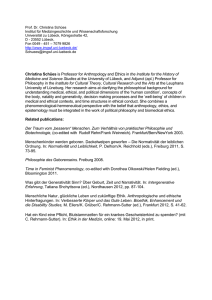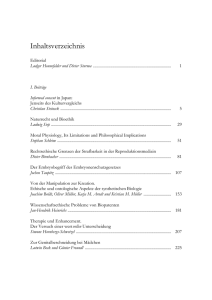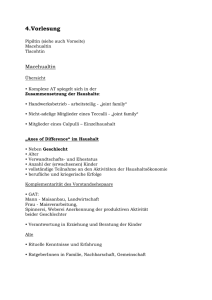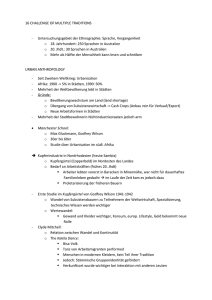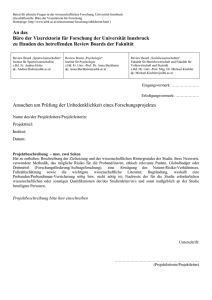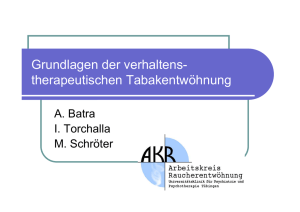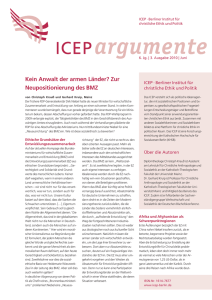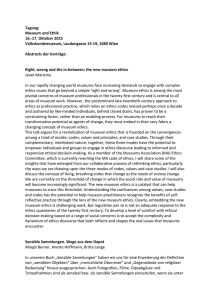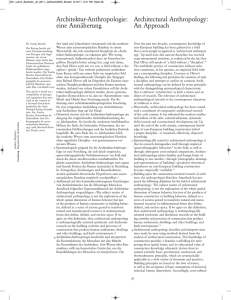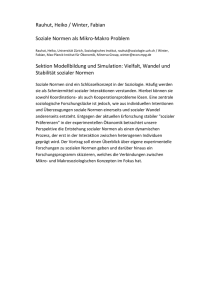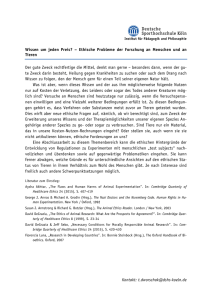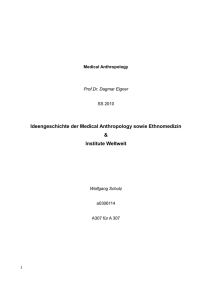Ethik in der Praxis der entwicklungspolitischen Zusammenarbeit
Werbung
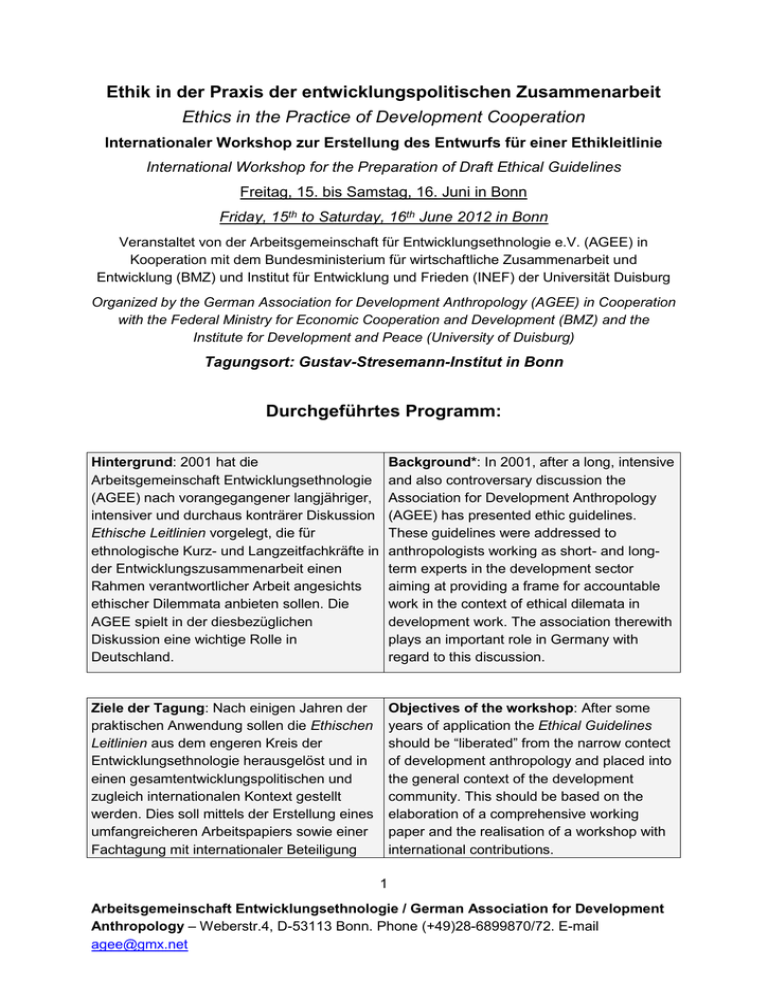
Ethik in der Praxis der entwicklungspolitischen Zusammenarbeit Ethics in the Practice of Development Cooperation Internationaler Workshop zur Erstellung des Entwurfs für einer Ethikleitlinie International Workshop for the Preparation of Draft Ethical Guidelines Freitag, 15. bis Samstag, 16. Juni in Bonn Friday, 15th to Saturday, 16th June 2012 in Bonn Veranstaltet von der Arbeitsgemeinschaft für Entwicklungsethnologie e.V. (AGEE) in Kooperation mit dem Bundesministerium für wirtschaftliche Zusammenarbeit und Entwicklung (BMZ) und Institut für Entwicklung und Frieden (INEF) der Universität Duisburg Organized by the German Association for Development Anthropology (AGEE) in Cooperation with the Federal Ministry for Economic Cooperation and Development (BMZ) and the Institute for Development and Peace (University of Duisburg) Tagungsort: Gustav-Stresemann-Institut in Bonn Durchgeführtes Programm: Hintergrund: 2001 hat die Arbeitsgemeinschaft Entwicklungsethnologie (AGEE) nach vorangegangener langjähriger, intensiver und durchaus konträrer Diskussion Ethische Leitlinien vorgelegt, die für ethnologische Kurz- und Langzeitfachkräfte in der Entwicklungszusammenarbeit einen Rahmen verantwortlicher Arbeit angesichts ethischer Dilemmata anbieten sollen. Die AGEE spielt in der diesbezüglichen Diskussion eine wichtige Rolle in Deutschland. Background*: In 2001, after a long, intensive and also controversary discussion the Association for Development Anthropology (AGEE) has presented ethic guidelines. These guidelines were addressed to anthropologists working as short- and longterm experts in the development sector aiming at providing a frame for accountable work in the context of ethical dilemata in development work. The association therewith plays an important role in Germany with regard to this discussion. Ziele der Tagung: Nach einigen Jahren der praktischen Anwendung sollen die Ethischen Leitlinien aus dem engeren Kreis der Entwicklungsethnologie herausgelöst und in einen gesamtentwicklungspolitischen und zugleich internationalen Kontext gestellt werden. Dies soll mittels der Erstellung eines umfangreicheren Arbeitspapiers sowie einer Fachtagung mit internationaler Beteiligung Objectives of the workshop: After some years of application the Ethical Guidelines should be “liberated” from the narrow contect of development anthropology and placed into the general context of the development community. This should be based on the elaboration of a comprehensive working paper and the realisation of a workshop with international contributions. 1 Arbeitsgemeinschaft Entwicklungsethnologie / German Association for Development Anthropology – Weberstr.4, D-53113 Bonn. Phone (+49)28-6899870/72. E-mail [email protected] erfolgen. Die Ethischen Leitlinien sollen so geöffnet und erweitert werden, dass sie den internationalen aktuellen Diskussionsstand reflektieren und dabei Entwicklungen, die zwischenzeitlich stattgefunden haben, berücksichtigen. Angesichts der bisher geringen Beachtung des Themas in der Praxis soll damit auch ein innovativer Beitrag nicht nur für die deutsche Entwicklungsethnologie, sondern für den gesamten entwicklungspolitischen Bereich geleistet werden. The Ethical Guidelines should be unclosed and adjusted so that they reflect the current international discussion and all evolutions regarding the subject since their presentation in 2001. Regarding the limited attention which the subject of ethical guidelines so far has found in Germany, thereby, an innovative input should be rendered not only for the German development anthropology but also for the development sector in general. Zentrale Fragestellungen auf der Tagung: 1. Notwendigkeit und Umfang eines an den universellen Menschenrechten orientierten Committments der Akteure bezüglich Kernfragen von Entwicklung(szielen), Armutsbekämpfung, Menschenrechten, Partizipation und Gendergerechtigkeit und damit dem Bekenntnis gegen einen uneingeschränkten Kulturrelativismus, Central questions of the workshop: 1. Committment: Necessity and complexity of a committment of the stakeholders in the development sector directed towards the main challenges of development goals, poverty alleviation, human rights, participation and gender justice. With this a confession against unlimited cultural relativism is being linked. 2. ethisch reflektierte und angemessene Verhaltensweisen in der praktischen Entwicklungsarbeit (d.h. die konkreten Verhaltensvorgaben zu verschiedenen Interaktionsbereichen mit der Bevölkerung), sowie 2. Content: ethically reflected and appropriate behaviour in practical development work (i.e. actual defaults for behaviour in the various areas of interaction with the population), and 3. The degree and creation of (legal) binding regarding ethical commitments (i.e. considerations on how the guidelines can be applicated in practical development work). 3. Grad und Herstellung von Verbindlichkeit ethischer Verpflichtungen (d.h. Überlegungen, wie sich die Leitlinien in der Praxis der EZ umsetzen lassen). Für die Diskussion wird ein Arbeitspapier (Entwurf ethischer Leitlinien) vorbereitet und im April 2012 verschickt. For the discussion a working paper (draft of ethical guidelines) will be prepared and distributed in late April 2012. 2 Arbeitsgemeinschaft Entwicklungsethnologie / German Association for Development Anthropology – Weberstr.4, D-53113 Bonn. Phone (+49)28-6899870/72. E-mail [email protected] Programm der Tagung / Schedule of the Workshop Freitag, 15. Juni 2012 / Friday 15th June 2012 10.00-11.00 Anreise und Registrierung der Teilnehmer/innen / Arrival and registration of participants 11.00-11.45 Eröffnung durch BMZ, AGEE und INEF; Präsentation des Arbeitspapiers Opening speech by BMZ and AGEE, presentation of the working paper Prof. Dr. Michael Schönhuth (Vorstand AGEE), Dr. Christiane BögemannHagedorn (Leiterin der Unterabteilung 11 - Zivilgesellschaft und Wirtschaft - des BMZ), Prof. Dr. Tobias Debiel, Direktor INEF (Universität Duisburg), Prof. Dr. Frank Bliss (Vorsitzender AGEE; Mitglied Innovationsbeirat des BMZ) 11.45-12.30 Kernvortrag 1*: Auf dem Weg zu einer kosmopolitischen Entwicklungs-Ethik. Prof. Dr. Christoph Antweiler, Universität Bonn (auf Englisch) Key note 1*: Towards a Cosmopolitan Ethics for Development (English language) 12.30-13.30 Mittagspause / Lunch break 13.30-14.15 Kernvortrag 2*: Ethik und Ethnologie: Auf dem Weg zu einem Ethik-Kodex, Prof. Hans Peter Hahn, Deutsche Gesellschaft für Völkerkunde / German Anthropological Association (auf Englisch) Key note 2*: Ethics and social anthropology: Steps towards an ethical codex (English language) 14.15-15.00 Kernvortrag 3: Von der „ethnologischen“ Ethik zu einer gemeinsamen Ethik in der Entwicklungszusammenarbeit. Prof. Dr. Michael Schönhuth, Universität Trier (auf Englisch) Key note 3: From an ethics of social anthropology to a common ethics of development cooperation (English language) 15.00-15.15 Kaffeepause/Coffee break 15.15-16.15 Kernvortrag 4: Ethische Herausforderungen aus der Perspektive der schwedischen Entwicklungsethnologie, Prof. Dr. Sten Hagberg, Universität Uppsala (auf Englisch) Key note 4: Ethical challenges as viewed by the “Nordic” Development Anthropology (English language) 16.15-17.15 Kernvortrag 5: Ethische Herausforderungen aus der Perspektive des EZPartnerlandes Burkina Faso, Dr. Ludovic Kibora, Journalist, Ouagadougou Key note 5: Ethical challenges as viewed from the prospective of Burkina Faso (English language) 17.15-17.30 Kurze Pause/short break 3 Arbeitsgemeinschaft Entwicklungsethnologie / German Association for Development Anthropology – Weberstr.4, D-53113 Bonn. Phone (+49)28-6899870/72. E-mail [email protected] 17.30-18.30 Kernvortrag 6: Die ethische Debatte in Indien – Ein Beitrag zur Formulierung universeller ethischen Richtlinien für Aktive in der Entwicklungszusammenarbeit (Prof. Dr. Soumendra M. Patnaik, President, Indian Anthropological Association Department of Anthropology, University of Delhi) Key note 6: The Ethical debate in India - A contribution to the formulation of universal Ethical Guidelines for people active in the development process (in English language) 18.30 – 20.00 Abendessen / dinner 21.00 - Umtrunk / welcome drinks Samstag, 16. Juni 2012 / Saturday 16th June 2012 9.00-10.30 Panel I: Committment der Akteure zu den Kernfragen des Ethikpapiers (Commitment of relevant stakeholders regarding the ethical postulations) Gerold Dieke: Vorsitzender des Aufsichtsrats der GOPA Consult, Vorsitzender Innovationsbeirat des BMZ Vertreter (!) von Prof. Dr. Jürgen Wilhelm: Vorstandsmitglied der Deutschen Gesellschaft für Internationale Zusammenarbeit (GIZ) Peter Hesse: Hesse-Stiftung „Solidarity“ Tumenta F. Kennedy: Gründer und GF der African Business Information Bank (AfricanBIB) Frank Bliss: Moderation 10.30-10.45 Kaffeepause/coffee break 10.45-12.15 Panel II: Ethisch reflektierte und angemessene Verhaltensweisen. Diskussion der zentralen Forderungen (Ethically reflected and appropriate behaviour. Discussion of the central postulations, panel probably in English language) Dr. Heidi Armbruster: Anthropologist, University of Southampton Dr. Sabine Klocke-Daffa: Ethnologin, Universität Tübingen Michaela Zintl: Leiterin des Referates 211 - Evaluierung der EZ; Erfolgskontrolle und Wirkungsmessung - des BMZ Michael Schönhuth: Moderation 12.15-13.30 Mittagspause/lunch break 13.30-15.00 Panel III: Grad und Herstellung von Verbindlichkeit ethischer Verpflichtungen (Degree and creation of legal binding regarding ethical committments) Martin Wilde: Geschäftsführer des Bundes Katholischer Unternehmer (BKU), Mitglied Innovationsbeirat des BMZ Michael Rabbow: Boehringer-Ingelheim, Corporate Affairs Kurt Bangert: VENRO (Verband entwicklungspolitischer 4 Arbeitsgemeinschaft Entwicklungsethnologie / German Association for Development Anthropology – Weberstr.4, D-53113 Bonn. Phone (+49)28-6899870/72. E-mail [email protected] Nichtregierungsorganisationen, World Vision) Fabian Scholtes: Kreditanstalt für Wiederaufbau (KfW, Kompetenzcenter Entwicklung und Wissenschaftskooperation) Prof. Dr. Ulrich Daldrup: Geschäftsführer Gesellschaft für Forschung und Entwicklungsprojektierung (GFE) Plenumsstatement F. Bögemann-Hagedorn, BMZ Prof. Dr. Tobias Debiel: Moderation 15.00-15.15 Kaffepause/coffee break 15.15-16.15 Kernvortrag 7: Plädoyer für eine kämpferische Ethik in der Entwicklungszusammenarbeit. Dr. Asfa-Wossen Asserate (Consultant, Publizist) Key Note 7: Plea for a pugnacious ethics in development cooperation. 16.15-17.00 Umsetzungsfragen und Schlussrunde Questions regarding implementation and final discussion Participants under Panels I – III may change slighly. *All contributions of the workshop can be delivered in German or English language. For key notes a translation will be provided. Papers can also be presented in German or English. 5 Arbeitsgemeinschaft Entwicklungsethnologie / German Association for Development Anthropology – Weberstr.4, D-53113 Bonn. Phone (+49)28-6899870/72. E-mail [email protected]
